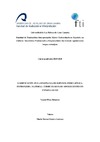Identificador persistente para citar o vincular este elemento:
https://accedacris.ulpgc.es/jspui/handle/10553/70255
| Campo DC | Valor | idioma |
|---|---|---|
| dc.contributor.advisor | Cáceres Lorenzo, M. Teresa | es |
| dc.contributor.author | Plata Betancor, Nauzet | es |
| dc.date.accessioned | 2020-02-12T17:34:52Z | - |
| dc.date.available | 2020-02-12T17:34:52Z | - |
| dc.date.issued | 2019 | - |
| dc.identifier.uri | https://accedacris.ulpgc.es/handle/10553/70255 | - |
| dc.description.abstract | El presente trabajo de fin de máster (TFM) pretende realizar un estudio sobre el uso de la gamificación en el proceso de enseñanza-aprendizaje del español como lengua extranjera en estudiantes de secundaria (grados 7 al 10 de Canadá). El punto principal de la investigación es la propuesta de una línea de acción curricular fundamentada en la gamificación como técnica de enseñanza orientada a los intereses y características de la generación actual de estudiantes para aumentar así su grado de motivación y mejorar su actitud hacia el aprendizaje. Este objetivo se ha materializado en los siguientes objetivos específicos: analizar y reconocer las fuentes de la motivación; determinar las ventajas del uso de dispositivos inteligentes en la educación y construir una línea de acción basada en el empleo de los elementos analizados. Con el fin de conseguir esos propósitos, y después de la lectura de fundamentación teórica se ha creado un material curricular diseñado para aprendientes anglófonos canadienses de educación secundaria. El TFM innovador que presentamos pretende ser un punto de inicio sobre el que cimentar nuevas propuestas curriculares orientadas al ámbito de enseñanza de lenguas basadas en la gamificación. | en_US |
| dc.description.abstract | This master’s final project (MFP) endeavors to make a study about the use of gamification within the teaching-learning process as a technique for the teaching of Spanish as a second language in students of secondary education (grades 7 to 10 of Canada). The main point of the investigation is the proposal of a curricular action line founded on gamification as a teaching technique orientated to the interests and characteristics of the new generation of students in order to enhance their grade of motivation and to improve their attitude towards learning. This objective has been embodied through the following specific objectives: to analyze and recognize the sources of motivation; to define the advantages of the use of smart devices on education and to create a curricular action line founded on the use of the analyzed elements. In order to achieve those purposes, and after the read of theoretical foundation it has been created a curricular material designed for Canadian anglophone students of secondary education. The innovative MFP presented here endeavors to be a starting point for the cementation of new curricular propositions orientated to the teaching of languages field based on gamification. | en_US |
| dc.language | spa | en_US |
| dc.subject | 570111 Enseñanza de lenguas | en_US |
| dc.subject.other | Gamificación | es |
| dc.subject.other | Educación | es |
| dc.subject.other | Español como lengua extranjera | es |
| dc.subject.other | Canadá | es |
| dc.subject.other | Gamification | es |
| dc.subject.other | Education | es |
| dc.subject.other | Spanish as a second language | es |
| dc.subject.other | Canada | es |
| dc.title | Gamificación en la enseñanza de español como lengua extranjera. Material curricular para adolescentes en Canadá (A1-A2) | es |
| dc.type | info:eu-repo/semantics/bachelorThesis | es |
| dc.type | BachelorThesis | es |
| dc.contributor.facultad | Facultad de Traducción e Interpretación | en_US |
| dc.investigacion | Artes y Humanidades | en_US |
| dc.type2 | Trabajo final de grado | en_US |
| dc.identifier.matricula | TFT-56222 | es |
| dc.identifier.ulpgc | Sí | es |
| dc.contributor.titulacion | Máster Universitario en Español y su Cultura: Desarrollos Profesionales y Empresariales | es |
| item.fulltext | Con texto completo | - |
| item.grantfulltext | open | - |
| crisitem.advisor.dept | GIR IATEXT: División de Estudios de Corpus y Lingüística Aplicada | - |
| crisitem.advisor.dept | IU de Análisis y Aplicaciones Textuales | - |
| crisitem.advisor.dept | Departamento de Filología Hispánica, Clásica y de Estudios Árabes y Orientales | - |
| Colección: | Trabajo final de grado | |
Visitas 1
681
actualizado el 10-ene-2026
Descargas
430
actualizado el 10-ene-2026
Google ScholarTM
Verifica
Comparte
Exporta metadatos
Los elementos en ULPGC accedaCRIS están protegidos por derechos de autor con todos los derechos reservados, a menos que se indique lo contrario.
